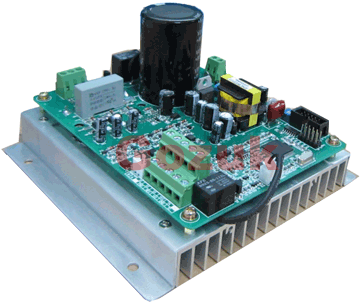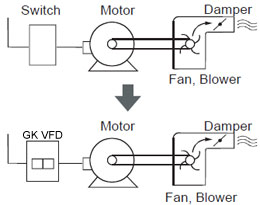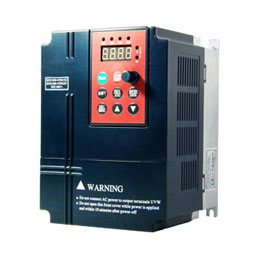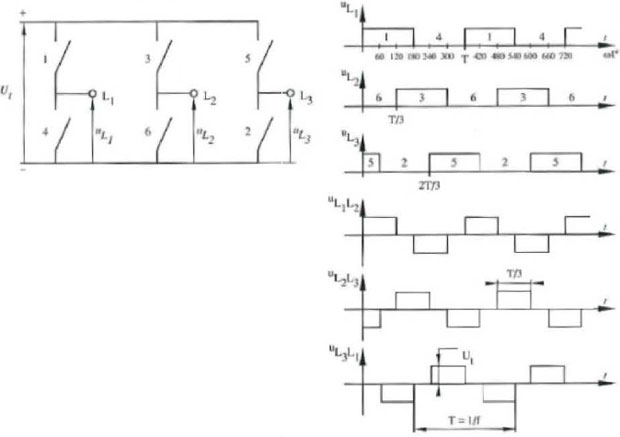Home » Variable Frequency Drives » Variable frequency drive Pros and Cons
Variable frequency drive Pros and Cons
Pros
Simply, there are so many advantages of variable frequency drive.
1. Stepless speed control up to 100 Hz (Twice the motor rated speed)
2. Synchronization of multi-motor operations.
3. Constant surface speed for winding application.
… …
Electrical AC motor speed if a fixed value determined by the grid frequency and the number of poles in the stator winding. On principle, you use a Variable Frequency Drive only when you need to adjust the motor speed. This is done by adjusting the VFD output frequency. You can change the frequency (so the speed) from approx 10% to 200%.
There are several applications that can benefit from this variable speed:
Cons
Even a single VFD in a small site can cause harmonics issues, but in most cases the harmonics are easy to control if you follow the drives manufacturers recommendations. And that's the key. Read the book and follow every piece of advice the manufacturer gives you. One short cut to save a few dollars can cause headaches later down the line. Which also means checking the electrical set up at your site to ensure everything is as it should be and pay close attention to your ground grid, it's the most over looked portion of the electrical and causes a lot of problems.
Simply, there are so many advantages of variable frequency drive.
1. Stepless speed control up to 100 Hz (Twice the motor rated speed)
2. Synchronization of multi-motor operations.
3. Constant surface speed for winding application.
… …
Electrical AC motor speed if a fixed value determined by the grid frequency and the number of poles in the stator winding. On principle, you use a Variable Frequency Drive only when you need to adjust the motor speed. This is done by adjusting the VFD output frequency. You can change the frequency (so the speed) from approx 10% to 200%.
There are several applications that can benefit from this variable speed:
- Linear speed sync to compensate speed changes because of mesh issues
- Smooth start & stop of very heavy elements (using delayed speed ramp from 0 to 100% to start and 100% to 0% to stop)
- You can use VFD as motor electrical brake by sudden injection of DC (zero Hz frequency)
-
This list can be as long as you can imagine... ...
Cons
Even a single VFD in a small site can cause harmonics issues, but in most cases the harmonics are easy to control if you follow the drives manufacturers recommendations. And that's the key. Read the book and follow every piece of advice the manufacturer gives you. One short cut to save a few dollars can cause headaches later down the line. Which also means checking the electrical set up at your site to ensure everything is as it should be and pay close attention to your ground grid, it's the most over looked portion of the electrical and causes a lot of problems.
You may also like:
Featured Articles
Non-Enclosure Variable Frequency Drive ...
 No enclosure (cover), reducing installation space and cost effective. Widely used in All-In-One control cabinet. Keep the same ...
No enclosure (cover), reducing installation space and cost effective. Widely used in All-In-One control cabinet. Keep the same ...
 No enclosure (cover), reducing installation space and cost effective. Widely used in All-In-One control cabinet. Keep the same ...
No enclosure (cover), reducing installation space and cost effective. Widely used in All-In-One control cabinet. Keep the same ...Variable frequency drive application ...
 Variable Frequency Drive (VFD) can be used in lots of fields. Variable frequency drives are widely used to control the speed of ...
Variable Frequency Drive (VFD) can be used in lots of fields. Variable frequency drives are widely used to control the speed of ...
 Variable Frequency Drive (VFD) can be used in lots of fields. Variable frequency drives are widely used to control the speed of ...
Variable Frequency Drive (VFD) can be used in lots of fields. Variable frequency drives are widely used to control the speed of ...Variable frequency drive in HVAC ...
 Variable frequency drives (VFD) have been used for HVAC systems in buildings for more than 40 years. But only in recent years, ...
Variable frequency drives (VFD) have been used for HVAC systems in buildings for more than 40 years. But only in recent years, ...
 Variable frequency drives (VFD) have been used for HVAC systems in buildings for more than 40 years. But only in recent years, ...
Variable frequency drives (VFD) have been used for HVAC systems in buildings for more than 40 years. But only in recent years, ...Variable Frequency Drive Harmonics and ...
A discussion of the benefits of variable frequency drives often leads to a question regarding electrical harmonic distortion ...
Three phase inverters
 In the variable frequency drive rectifier paper, it explains how to go from three phase alternating current voltage to a direct ...
In the variable frequency drive rectifier paper, it explains how to go from three phase alternating current voltage to a direct ...
 In the variable frequency drive rectifier paper, it explains how to go from three phase alternating current voltage to a direct ...
In the variable frequency drive rectifier paper, it explains how to go from three phase alternating current voltage to a direct ...
VFD manufacturers

. Cost of a VFD is typically higher and cost of maintenance is higher as well; lifetime cost is also higher due to shorter lifespan
. May cause resonance at different speeds
. More heat, noise, and vibration